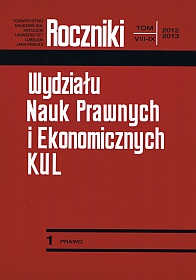Twenty Years of the Border Guard
Abstract
Till 1990, during communist period, phenomenon of migration (legal or illegal) doesn’t exist in Poland. Because of many obstacles, not many foreigners were coming to Poland. the development of border traffic after 1990 has also caused the increase of unwanted immigration to Poland, especially from the former Soviet Union countries and then from south-eastern Asia. the changes taking place in Poland after 1989 did not avoid border protection system and border services, inter alia, Border Guard. Legislative package of new regulations established by the polish Parliament initiated a series of changes in the field of protection of the polish state border. in place of the Border Protection Force a new formation – the Border Guard was established, on 16 May 1991, to protect polish border. Changes in the tasks of the Border Guard in the years 1990-2010 followed successively and were dynamic and adapted to the political situation, conditions and needs of the State. the primary purposes of the Border Guard as border service such as protect the state border on land and at sea as well as border traffic control, were remained. With the changes of tasks followed changes in the methods and forms of making of these tasks and organizational structure of the formation. At the beginning of 1990's Poland had to built almost whole border infrastructure on eastern border to serve increasing border traffic as well as protect so-called “green border” and then adapted border protect and border control to Polish membership in the European Union. Currently, the Border Guard performs many new tasks defined both in the Border Guard Act, as well as many other laws or resulting directly from the international agreements and European Union law. the legal bases formed over the years are now undertaken at an international cooperation with the border services of other states, as well provide flexibility to operate modern, fully professional service responsible for ensuring public safety and order in the country. This process has not been completed yet, and certainly further changes facing the Border Guard.
Copyright (c) 2013 Roczniki Wydziału Nauk Prawnych i Ekonomicznych KUL

This work is licensed under a Creative Commons Attribution-NonCommercial-NoDerivatives 4.0 International License.

